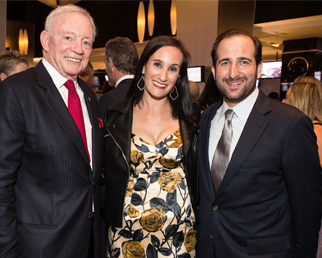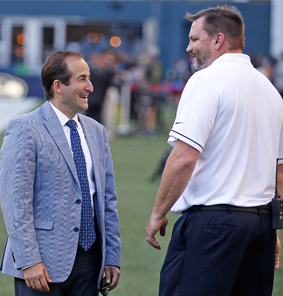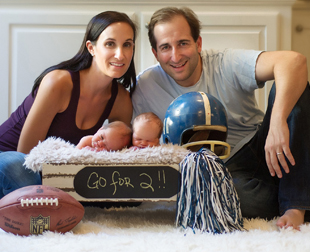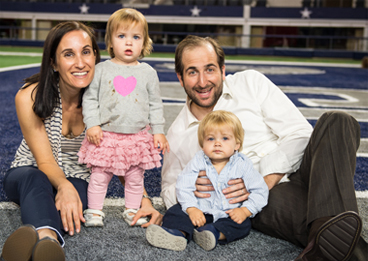© 2016 The Texas Lawbook.
By Mark Curriden
(Sept. 15) – Dallas Cowboys owner Jerry Jones was about to offer Jason Cohen the job of being the team’s general counsel.
The interviews had gone extraordinarily well. Affable and hard working, Cohen’s grasp of sports law and the business side of the National Football League were impressive. References heaped praised on Cohen as a lawyer and a person.
But Jones had one final question.
“You are a Cowboys fan, aren’t you?”
“I thought, ‘Oh crap!’ And everything was going so well,” Cohen says. “If I told him the truth, that’s not a good answer and this job opportunity is gone. If I lied to him, that’s a terrible way to start and I knew he would see right through it.”
The corporate lawyer took another approach.
“Mr. Jones, if I am selected to be your general counsel, I’m going to need to be in a position where I tell you the truth and tell you things you don’t want to hear and not sugarcoat anything,” Cohen told Jones that summer day in 2013. “So, we should start off on the right foot.
“I’m a huge New York Giants fan.”
Jones nodded patiently as Cohen mentioned the names of Phil Simms, Lawrence Taylor and other Giant greats and then he abruptly pointed to the trophy case in his office and the four Super Bowl rings.
“Jerry reminded me that he had more rings and more trophies than the Giants had and that he would be getting more in the future than the Giants would,” Cohen says.

Three years later, Cohen stood in the Cowboys executive suite last Sunday watching as those last few frustrating seconds ticked off the game clock. Devastated by the team’s opening season loss to the favorite team of his youth, Cohen’s loyalty to the Cowboys is no longer in question.
“I’m in a deep funk for two days after the Cowboys lose,” he says. “It eats at me… and I’m just the team’s lawyer, not the general manager or a coach.”
Despite being only 36-years-old, Cohen has been involved in some of the biggest business decisions facing the Cowboys and the Jones family during his three years with the Cowboys.
He helped negotiate with AT&T over naming rights for the team’s stadium in Arlington – a deal that is reportedly the largest in pro sports. He advised the Jones family on the development of the practice facilities and headquarters in Frisco. He wrote contracts for the team’s players and coaches, negotiated media and sponsorship deals, sued to enforce the Cowboys’ intellectual property and represented the owners in discussions with the NFL over league policies and procedures.
“Jason had great experience at the highest level of a very popular sports entity in NASCAR and had a great understanding of how a strong fan following, great sports venues and television exposure come together to create tremendous interest in a sport,” Cowboys CEO Stephen Jones said in an email.
Jones said the family conducted “an exhaustive search with many qualified candidates, and Jason showed he had a solid background with many varied successful experiences to go along with wonderful people skills.”
Robert Hart, who is executive vice president and general counsel for Mark Cuban Companies and the Dallas Mavericks, says Cohen possesses the necessary and specialized traits required to be a successful legal adviser for the high-profile Cowboys and its owners.
“Jason has a quick mind and a ‘can do’ personality that suits his position well,” Hart says. “Working for someone as business savvy and industrious as Jerry Jones requires one to try to be three steps ahead, knowing you are almost always three steps behind on information flow.
“Family businesses run by entrepreneurial people means that they can, and often do, multi-task on numerous projects and shift directions based upon ever-changing information,” Hart says. “This can put some unusual stress on their legal departments to execute timely. Family-run businesses have a certain distinct personality culture that is unique to the founder.
 “Jason appears to be a perfect fit in the Jones’ and Cowboys’ organization,” he said.
“Jason appears to be a perfect fit in the Jones’ and Cowboys’ organization,” he said.
Marc Katz, a labor and employment partner at Andrews Kurth, agrees that Cohen is the full package.
“Jason is an excellent and smart lawyer, but he has the mind of a business executive, which means he looks for solutions to problem,” says Katz, who has worked with Cohen and other professional sports franchises on employment contract issues.
Cohen’s journey to becoming the lead lawyer for the Dallas Cowboys took several twists and turns.
He’s lived in a mud hut in southern Africa and basically lived out of the back of his grandmother’s Volvo while doing a free internship with the Oakland Raiders. He moved pianos at night while working for the Minnesota Vikings during the day and became a senior lawyer with NASCAR despite never having watched a race.
Did I mention that he’s only 36?
Cohen was born and raised in northern New Jersey – about 20 minutes outside of Manhattan. His father is a solo practitioner who handled real estate, personal injury, criminal law and just about any other client who walked in the front door. His mother is the student assistance counselor at a local high school.
Law school, he says, was inevitable.
“I loved mock trial and debate in college,” he says. “I loved history and precedent. I saw my dad as a problem-solver who helped people.”
Upon graduating from college, Cohen followed a family tradition of doing one year of public service.
After researching the possibilities, he volunteered to help Right to Play, a United Nations refugee effort supported by Nike that uses sports and games to teach essential life skills to children across the globe.
“I requested the most rural place they could send me and they sure gave it to me,” he says.
Right to Play officials sent Cohen to Zambia, where he lived in a mud hut with no running water or electricity for six months. The 12-hour bus ride from Lasaka to Kawambwa, a small town in northern Zambia near the border of the Congo, was like a scene from Indiana Jones.
“The buses were old school buses that could never pass inspections and the roads ranged from loose gravel to nothing more than muddy paths,” he says. “I shared seats with goats and chickens. We picked up riders along the way that herded their livestock onto the bus.”
For three decades, Zambia has faced an AIDS epidemic. Nearly one in five people test positive for the HIV/AIDS virus.
Because Cohen spoke no Swahili or Bemba, he used the universal language of sports – specifically soccer – to communicate HIV awareness with the children and young adults. The village was filled with Zambian natives and thousands of refugees from the Congo. Every meal consisted of the same food: a porridge of smashed plantains and other vegetables and beans and rice.
“Whenever I think we have it tough, I remember the folks I met in Zambia who wake up every morning wondering where they were going to get food to eat,” he says. “It puts everything into perspective.
“It was unlike anything I had ever seen or would ever see,” he says.
In 2003, Cohen started law school at Rutgers. During his first year, he came across a four-decade-old lawsuit that forever shaped his career path.
The lawsuit featured Chicago Cubs fan and minority shareholder Bill Schlensky suing to force the team’s primary owner, Philip Wrigley, to add lights to the ballpark so the team could play games at night. Schlensky argued the Cubs owners have a responsibility to the team’s shareholders to add the lights because night games produced more revenue.
The courts sided with Wrigley, stating that absent evidence of fraud or malfeasance, the courts should avoid getting involved in business decisions even if those business decisions make no sense.
“This case featured the intersection of law, sports and business,” Cohen says. “I decided right then that I wanted to see if there was a career for me at that intersection.”
The first year law student used his free access to Lexis-Nexis to identify all law firms that represented professional sports teams. He contacted the legal departments for every pro sports franchise and the law firms that represented them seeking a summer internship.
None responded to his letters. Instead of accepting a summer clerkship at one of the law firms offering a job, Cohen packed up his grandmother’s 1985 Volvo and drove west from New Jersey to the San Francisco Bay.
“I read that the Oakland Raiders and owner Al Davis were very litigious and had four full-time lawyers working for the team, which was unheard of at that point,” he says.
The decision paid off. The Raiders, impressed by Cohen’s doggedness, hired him for the summer.
“I got to see how the Raiders did business,” he says. “I loved the work.”
Before he started his trip to California, he emailed Karen Linsky, a college friend who lived in the Bay area and worked at Bear Stearns, asking if she would be his tour guide and whether she had any “hot friends” she could introduce to him.
“I still have Jason’s email,” says Karen Cohen, who married Jason five years later. “I showed it to everyone at our wedding.”
Two years ago tomorrow, Sept. 16, the couple had twins – daughter Charlotte Adele and son Jackson Nathan.

The next summer, Cohen clerked for a traditional law firm in Philadelphia.
“I was put in a back office and had very little contact with clients,” he says. “The firm was terrific, but the idea of working at a law firm did not appeal to me at all.”
During his final year of law school, Cohen noticed that a New Jersey lawyer and commercial real estate developer named Zygi Wilf and a group of investors that included Wilf’s brother had purchased the Minnesota Vikings for $600 million.
“Whenever there’s a change in ownership, there’s an opportunity for work,” Cohen says. “So I used every connection I had to get my name in front of them. I learned where the Wilfs did their dry cleaning and where they got their Chinese food takeout.”
Cohen turned down job offers from several law firms for the outside chance that the Vikings might hire him.
“My family and friends thought I was crazy to turn down legitimate and good paying legal jobs to go for this long-shot position,” he says. “The only time Zygi and his brother, Mark, could meet me was the afternoon before I was scheduled to take the bar exam.”
Cohen drove to the Wilf family offices in Northern New Jersey where he spent an hour explaining to the brothers how he could help them save money in various litigation matters they were facing.
The Wilf brothers were impressed, but they left the final decision to Vikings general counsel Kevin Warren.
“Kevin told me that if I got in my car and drove to Minnesota, that he would probably hire me,” Cohen says. “I had no idea what my salary would be.”
Warren, who is now the chief operating officer of the Vikings, said Cohen was the best hiring decision he’s ever made.
“There are a lot of talented lawyers out there, but there are very few who also have a great mind for business as Jason does,” he says. “A lot of the policies and procedures we have in place today and a lot of the documents we use today were created by Jason.”
Warren says he wasn’t able to pay Cohen much at first. He learned that Cohen was renting a one-bedroom apartment that resembled a large closet.
“I found out that Jason was working at nights moving pianos just to make ends meet,” he says. “So many young lawyers want to be in this business for the wrong reason. Jason has earned every bit of the success he’s now received.”
In 2009, a group of Yahoo executives funded the start up of a professional women’s soccer league. They asked Cohen to be part of the executive team and the league’s first legal counsel.
“We had to make it as we went along, but I learned how to deal with media companies, labor and employment issues related to the players and coaches, sponsorships and protection of intellectual property,” he says. “All of those experiences later helped me a lot in my job with the Cowboys.”
Unfortunately, the soccer league survived only a year and Cohen was forced to seek employment elsewhere. At the same time, the financial crisis hit Wall Street. Bear Stearns closed shop and Karen was at a crossroads, too.
That’s when NASCAR came calling.
“I knew nothing about racing or NASCAR, but I quickly learned that it had business and legal issues that were fast moving and fascinating,” he says.
By 2010, the Cohens moved to Daytona Beach. Karen joined a new bank and Jason sped into racing.
“I must say that I really got into NASCAR,” he says. “I started learning the nuances of racing – four-wide, differences in tracks and pole positioning – way beyond just driving around the track. I wondered around pit row and inside the garage – a lot of places I probably had no business being.
“On any given weekend, NASCAR is the largest event in the United States,” he says.
In April 2013, Dallas Cowboys general counsel Alec Scheiner told Cohen he was leaving the position to become president of the Cleveland Browns. Scheiner recommended Cohen apply for the job.
Cohen initially declined.
“Karen and I loved living on the beach,” he says. “In fact, we were literally on the beach when the Cowboys called.”
Cohen eventually met with different members of the Jones family. The interviews went well and he got the job. They needed him to start right away.
“[Jason] was thrown into the fire immediately on his date of hire,” Stephen Jones said. “We were well into the negotiations for the title sponsorship of our stadium with AT&T, and [Jason] became completely immersed in those negotiations before he even moved to Texas or knew where his office would be.”
Cohen says that he was about to head to the office for his first day at work when he was directed to report to the downtown Dallas offices of law firm Haynes and Boone, which represented AT&T. Winstead represented the Cowboys.
“We worked day and night that first week to get the deal done,” Cohen says. “My welcome party was planned for that Friday, but we hit a snag in negotiations with AT&T.”
The negotiations, according to lawyers who attended, went late into the night.
“Jason jumped right into the negotiations running,” says Winstead law shareholder Ken Kopf. “Jason works 24/7. He is always on call. He realizes that is part of the job.”
“Karen made it to my welcome party, but I never did,” Cohen says.
The next Monday, Cohen was again about to head to his office for the first time when he was again diverted.
“I was told I had to be at a meeting in Frisco,” he says. “I was so excited because I always love going back to San Francisco. I quickly learned Frisco was in North Dallas.”
Cohen was immediately plunged into the complex negotiations over the development of the property for the new headquarters and practice facility, known as The Star. The $1.5 billion complex covers 91 acres and includes a 12,000-seat indoor football stadium sponsored by Ford Motor Co. and partnership with Omni for a luxury hotel and Baylor for medial services.
Three years later, Cohen’s office in the new 40,000 square-foot business center overlooks the new outdoor practice field.
The biggest surprise about his job, Cohen says, is the amount and breadth of the legal and business work that flows through his office.
“It’s a challenge for me and my team because all the business interests for the Jones family flows through this office,” he says. “It’s not just Jerry Jones, Senior. The three children – Stephen, Charlotte and Jerry Jr. – are all very involved in every aspect of the business. They continue to challenge me and my strong and hard-working team.”
Winstead partner Paul Wageman says the demands of the Cowboys’ general counsel job actually plays to Cohen’s strengths.
“Jason is able to juggle so many important and complex issues at the same time,” Wageman says. “Jerry is someone who has new ideas every minute and it takes a special kind of lawyer to have the flexibility, the breadth of knowledge and the energy to keep up.

“It is clear that Jason has earned the trust and respect of the Jones family,” he says.
“As legal counsel, I try to minimize risk and I couldn’t be more conservative, but I also realize that I work with people who like to work in the gray area and take on risk,” he says. “By nature, Mr. Jones is in the oil and gas industry in the wildcatter role. I don’t want to be Dr. No and putting up roadblocks, so the key for me is to find solutions and ways to minimize my clients’ risks.”
Today, there is no doubt about Cohen’s loyalty to the Cowboys. In fact, he can point to the exact second it happened.
The date was Nov. 24, 2013. The Cowboys were playing the Giants in the Meadowlands. The game was tied 21-21. With no time on the clock, Cowboys kicker Dan Bailey booted a 35-yard field goal for the victory.
“At that moment, it was like an exorcism had taken place,” Cohen says. “I was jumping around and celebrating with the Jones family that the Cowboys had just beat the Giants. It was a crazy range of emotions.”
© 2016 The Texas Lawbook. Content of The Texas Lawbook is controlled and protected by specific licensing agreements with our subscribers and under federal copyright laws. Any distribution of this content without the consent of The Texas Lawbook is prohibited.
If you see any inaccuracy in any article in The Texas Lawbook, please contact us. Our goal is content that is 100% true and accurate. Thank you.
